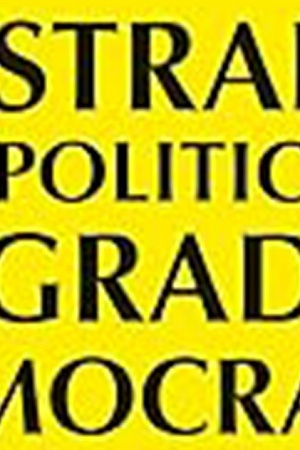The Surprise Party: How the Coalition went from chaos to comeback
Black Inc., $29.99 pb, 256 pp, 9781760642174
The Surprise Party: How the Coalition went from chaos to comeback by Aaron Patrick
You didn’t have to be Antony Green to know that by seven o’clock on election night things were looking very bad for Bill Shorten. The problem itself wasn’t complicated. While all the available polling suggested that Labor would gain support, the majority of booth results said that Labor was going backwards. Numbers were breaking for Scott Morrison, with the Liberal National Party driving a bulldozer through Queensland, while expected Labor gains in Melbourne remaining stubbornly out of reach. Echoes of Don’s Party were hard to ignore.
For Shorten, the whiplash must have been immense. While the Labor leader knew from internal research that the election was closer than publicly recognised, few people seriously believed he could lose. Why would they? A term of unbroken polling supremacy, three recycled prime ministers, a dysfunctional Coalition teetering on the edge of splitting – this was a government destined for punishment, according to all conventional wisdom. And yet, despite this very public mess, Scott Morrison somehow managed to win. This improbable victory, still shocking six months on, is the subject of Aaron Patrick’s new book, The Surprise Party: How the Coalition went from chaos to comeback. Part history, part insider journalism, it’s one of the first book-length autopsies of the election. It’s unlikely to be the last.
Patrick begins this story a year out from the vote, with Turnbull hanging on to power and Morrison his ostensibly loyal treasurer. This allows a full view of twelve strange months in Australian history: from the ‘Super Saturday’ by-elections that convinced Queensland conservatives that Turnbull could never win their state; to the slow, brutal stalking of Turnbull, which ended in Morrison’s surprise ascension; to the state elections in Victoria and New South Wales, which respectively suggested doom and possible hope for the federal Liberal Party.
Patrick recalls some significant, if occasionally tangential, chapters of our recent past. Some of these already feel forgotten, like the scuffle between Turnbull’s office and the ABC, or Michael Daley taking on Alan Jones over the Sydney Cricket Ground Trust. Other editorial decisions are more perplexing. Patrick spends an inexplicable amount of time psychoanalysing Alex Turnbull, the former prime minister’s son, including his place within the playground hierarchy at Sydney Grammar. For anyone living outside a select few postcodes, this is likely to feel gratuitous.
On the book’s central question, Patrick is more focused. The Surprise Party is ruthlessly and consistently critical of Bill Shorten. He depicts the Labor leader as a man overburdened by self-confidence, with ‘an unwavering certainty that he would vanquish the Coalition government’. Patrick argues that this arrogance led to unnecessary risks, particularly the party’s ambitious tax policies, aimed at wealthy retirees and investment property owners. Shorten himself, coveting the prime ministership since youth, could sell neither the vision nor his own story; his ambition was too naked.
While these arguments can be overly personalised – Patrick seems to enjoy rubbing salt into Shorten’s considerable wounds – no honest examination of the election can avoid the question of leadership. But arrogance doesn’t explain everything. As Labor’s official election review found, the party’s large and unwieldy policy platform followed its own political logic. The foundation of this was a conviction that, after the Rudd and Gillard years, the party needed to present a balanced budget to voters. As time went on, shadow ministers developed spending proposals for their prospective portfolios. To balance these two things, Labor needed to find itself new revenue. Hence the franking credits.
When Morrison came to power in late 2018, he inherited a broken and demoralised party, as well as Labor’s political vulnerabilities. Paradoxically, the brutal changeover gave him more space than Turnbull ever enjoyed; people were exhausted by all the fighting. Free from conservative suspicion, Morrison had a short window to reorient the Coalition’s campaign more aggressively against Labor.
Morrison’s plan wasn’t complex; it also received important support by sympathetic parts of the media. In many ways, it reflected Turnbull’s own unfolding strategy: demonising Labor’s tax reforms, claiming a budget surplus, and then attacking Bill Shorten with every available weapon. But Morrison implemented it with relentless efficiency. Its success meant that, after two terms of conservative rule, the election was largely a referendum on Labor’s platform, by then six years in the making, built in pieces to combat three different Liberal leaders.
There is no escaping Morrison’s credit for this electoral pirouette. Beyond the strategic discipline, he managed to connect with regional and suburban voters in a way Turnbull never could. Part of this was his carefully cultivated image, marked by unpretentious clothing, fatherhood, and a performative love of rugby league. Part of it was his deliberate wedging of Labor over Adani and the future of coal mining in central Queensland. The book does a good job of mapping this project, both publicly and behind the scenes.
Still, for all Morrison’s unexpected success, certain temptations should be resisted. One is to assume that, just because Morrison won, everything he did showed tactical genius or that everything Shorten did contributed to his eventual loss. As Barack Obama’s chief strategist, David Axelrod, put it, ‘You’re never as smart as you look when you win, and you’re never as dumb as you look when you lose.’ Shorten managed to hold a traumatised party together for six years, taking down two prime ministers in the process. It clearly wasn’t all bad.
The other temptation is to make grandiose claims about the deeper significance of May 18. Every election is important; as another prime minister once said, they all change the country. But it’s not yet clear that this one will ‘redefine Australia’, as Patrick suggests, or that people chose ‘capitalism over paternalism’ in some definitive way. It is certainly true that people chose caution over uncertainty – Scott Morrison over the Labor alternative. It remains to be seen whether they will do the same next time.
While Patrick indulges in both tendencies on occasion, he can be forgiven these flourishes. This is a book about Scott Morrison’s remarkable triumph, which even his enemies cannot deny. The question is whether a political campaign built around opposition and critique, which excelled in destroying a more ambitious agenda, will also work as a project of government.















Comment (1)
Leave a comment
If you are an ABR subscriber, you will need to sign in to post a comment.
If you have forgotten your sign in details, or if you receive an error message when trying to submit your comment, please email your comment (and the name of the article to which it relates) to ABR Comments. We will review your comment and, subject to approval, we will post it under your name.
Please note that all comments must be approved by ABR and comply with our Terms & Conditions.